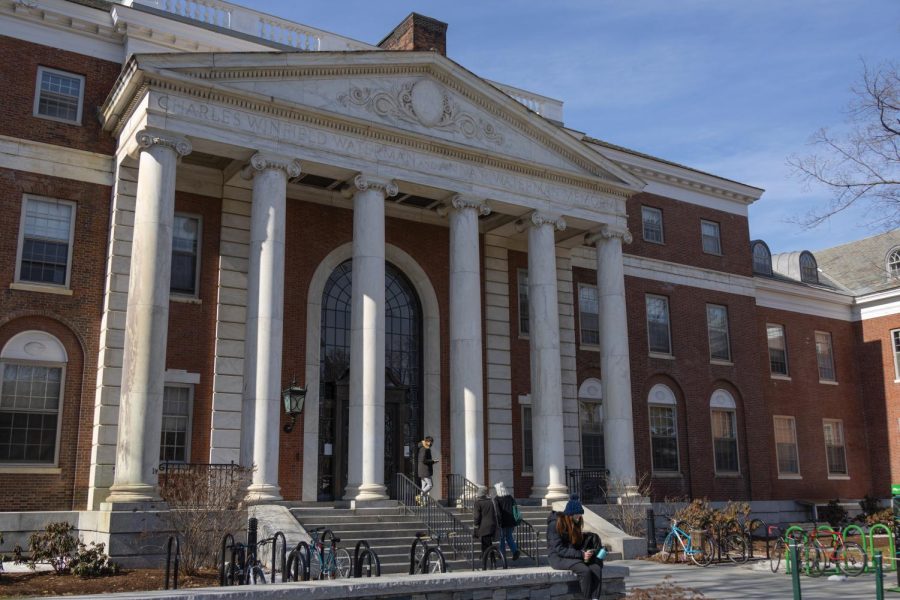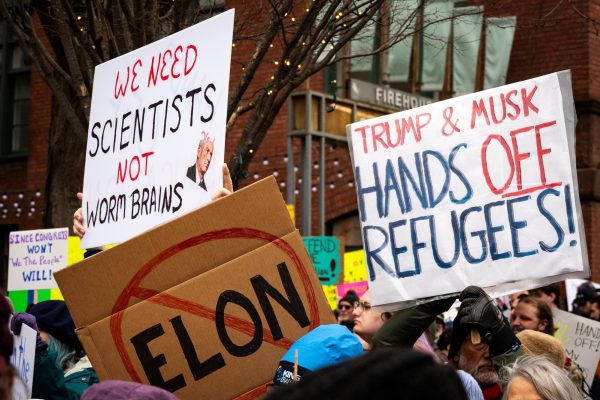Key takeaways from spring 2023 board of trustees meeting
The Waterman building sits on S Prospect Street March 2022.
UVM’s board of trustees resolved to establish an Institute for Agroecology and a School of World Languages and Cultures at its Feb. 11 meeting, according to the board’s meeting minutes.
The establishment of the IFA and the SWLC will help strengthen programs focused on food and sustainability, as well as facilitate the unification of UVM’s language departments, respectively, according to the minutes.
Educational Policy and Institutional Resources
Along with the formation of the IFA and SWLC, the board decided to terminate three Bachelor of Arts programs in the College of Arts and Sciences—European studies, Russian and Eastern European studies, and Latin American and Caribbean studies, according to the minutes.
This follows the most recent cuts in 2021 to two College of Agriculture and Life Sciences programs, according to a June 8, 2021 VTDigger article.
These three degrees will be removed due to low enrollment levels, but their content will be incorporated in the broader global studies major and there will be no faculty positions cut, according to materials from the board’s Educational Policy and Institutional Resources Committee.
The board also reexamined UVM’s Equal Opportunity Policy Statements and approved the Equal Opportunity in Educational Programs and Activities and Non-Harassment Policy Statement as well as the Equal Employment Opportunity and Affirmative Action Policy Statement without change, according to the minutes.
Budget, Finance and Investment
The board also carried out and made key revisions to its Debt Policy Annual Review, according to the minutes.
The Debt Policy is meant to establish limits to how the University measures the total amount of outstanding debt, which guides appropriate avenues of funding projects, according to the policy.
The Debt Policy will expand to include leases under the umbrella of University-supported debt. This means any leases connected to the University will also be considered when funding various plans, according to the policy.
UVM operates its lease accounting—specifically considering how UVM’s leases affect its other financials—by defining leases as ways to finance how a party uses an asset, as outlined by the Division of Finance and Administration.
By including leases in the policy and following this definition, the University will be able to better gauge its financial strength and perform long-term debt management, according to the policy.
The leverage ratio—a comparison of assets to debts to assess the amount of debt that contributes to UVM’s capital—was also changed in the Debt Policy. This means UVM will now evaluate their debt compared to their total assets, as opposed to their spendable assets, according to the policy.
This change was approved to better represent how much of the University’s total assets are owed, according to the policy.
UVM evaluates this debt-to-asset ratio to measure their capacity to take on more debt and with the goal of predicting the long-term status of University finances, according to the policy.
This updated process of evaluations will change the amount of assets financed by debt from a limit of one to 1.25x, allowing for at least 1.25 times the total assets than debt, according to the minutes.
The new limit means the University is limited to not having more than 1.25x of its assets financed by debt, which allows the University to take on more debt assets than the previous fiscal year, according to the policy.
The Budget, Finance and Investment Committee submitted the Statement of Investment Policies and Objectives to the board for reaffirmation and referral in the wake of changes to the Debt Policy, according to the minutes.
The Statement of Investment Policies and Objectives is a guide for the Budget, Finance and Investment Committee that outlines the responsibilities and procedures for the Committee as they handle UVM’s finances, according to the statement.
The board also approved the reappointments of H. Whitney Wagner and David Aronoff as advisors to the Investment Subcommittee for one year, effective March 1, according to the minutes.
Audit
Additionally, the board accepted the audited financial statements of the fiscal year 2022 after approval from the audit committee, according to the minutes.
The FY 2022 refers to the University’s financial handlings from the period of July 1, 2021 to June 30, 2022, according to UVM’s detailed operating budget.







